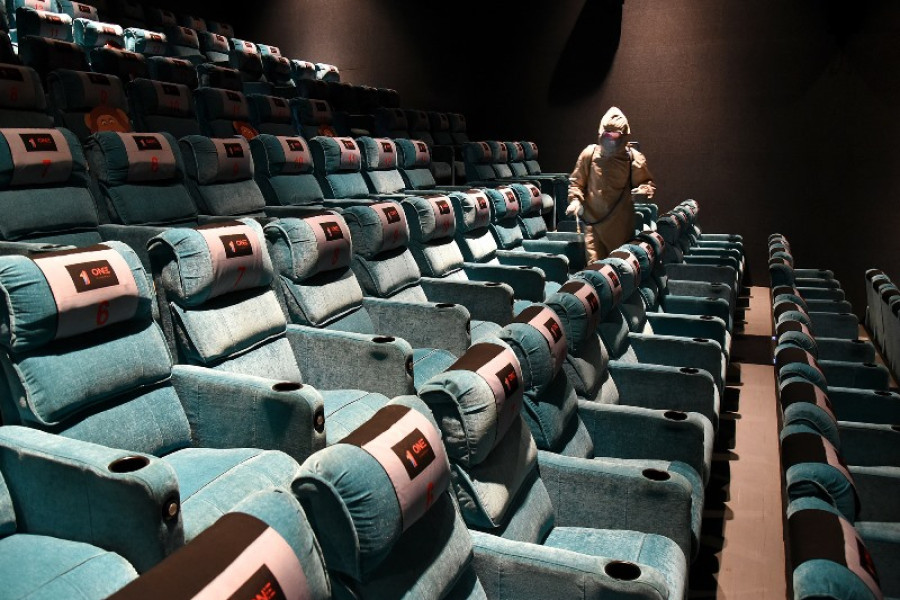Culture & Lifestyle
With no big films, cinema halls struggle to survive
Theatres have been opened for weeks now in the country, but with the coronavirus fear still rife and no big releases, business is terrible.
Tsering Ngodup Lama
Before the pandemic hit, watching movies at theatres was one of Choegyal Lama’s favourite leisure activities.
On March 19, 2020, when the government of Nepal directed movie theatres in the country to close to curb the spread of Covid-19, Lama, a movie buff, was bummed.
“But given the situation at that time, I knew it was the right thing to do but I had no clue then that it would be many, many months until I would go watch a movie again,” said Lama.
After remaining closed for almost 10 months, movie theatres in the country reopened on December 25, 2020.
“Last week, after almost 10 months, I finally got to watch a movie at a theatre,” said Lama. “Except for a handful of people, the theatre was empty. I had never seen the hall so empty and it was a surreal feeling watching a movie in an almost empty hall.”
Movie theatres were one of the first businesses to close due to the pandemic and one of the last to reopen. And although they have now been open for several weeks, in an environment where people are still taking as many health precautions as possible and with no major movies being released, cinema hall operators in the country have had to deal with low turnout.
“When we reopened, we knew safety was going to be one of the main concerns of the people and we knew we have to get the message across that FCube Cinemas is adhering to all the safety protocols to ensure safety and hygiene,” said Ramhari Koirala, HR Manager of FCube Cinemas, which is located at KL Tower in Chabahil. “We conduct temperature checks at the entrance, have made masks mandatory, and we also regularly sanitise frequently touched areas like door handles. We also regularly sanitise the lobby area several times a day, and after each show, the halls are sanitised.”
These are standard safety and hygiene measures adopted in all movie halls. To ensure social distancing, movie halls are also operating at 50 percent capacity.
“A lot of people who have come to watch movies at FCube Cinemas have been quite happy with the safety protocols we have in place, and more than the safety concerns, it is the lack of good movies in theatres that is keeping people away,” said Koirala.
Movie theatres that reopened in December last year did so by showing old movies that they were showing just before the pandemic forced them to close.
Films like Aama and Senti Virus, both Nepali movies, and Hollywood films like The Invisible Man and Bloodshot were being screened.
“We had no choice because there weren’t new releases to show at theatres,” said Roshan Adiga, CEO of QFX Cinemas, Nepal’s largest multiplex chain. “We were aware that pulling people to the theatres with old movies wasn’t going to be easy and we were right. In the first few days after we reopened, average occupancy was less than 10 people per show at our halls.”
Other cinema halls across the city were seeing low turnout as well.
For the first two weeks after reopening, FCube Cinemas, says Koirala, had less than five people per show.
At One Cinemas, which is located at Eyeplex Mall in New Baneshwor, the average occupancy per show in the first few days after reopening was less than five percent, says Aashish Udass, a supervisor at One Cinemas.
“For cinema hall operators, movies are our products and that’s what we sell and that’s what people come to us for. We can’t expect people to come to us at a time when we have nothing great to offer to them,” said Adiga.
Turnover at movie halls, says operators, saw an increase from January 14.
“That was the day, two new movies, Euta Esto Prem Kahani, a Nepali movie, and Vijay The Master, a South Indian movie, were released. The latter has been well received,” said Koirala. “The first few days of Vijay The Master shows at our halls saw very encouraging ticket sales.”
According to One Cinema’s Udass, some shows of the South Indian movie managed to record almost full occupancy at the theatre. “Even though we are in the midst of a pandemic, we had almost 100 percent occupancy, given we are operating only in 50 percent occupancy, was encouraging,” said Udass.
The increase in turnover, says Adiga, shows that people are willing to come to theatres if there are good movies being shown.
“We also get a lot of queries on social media on when movies like Wonder Woman 1984 and Tenet, both recently released Hollywood movies, will be shown in our theatres,” said Adiga. “This shows that there is demand for new movies and we believe that if good new movies are released, people will come to theatres, while not at pre-pandemic numbers, but enough to let cinema hall operators achieve because right now we are operating at loss.”
But given the low turnout at theatres, movie producers and distributors will continue to hesitate to release blockbuster movies, and people aren’t likely to come to theatres because there are no good movies to watch.
“Release dates of big blockbuster movies have all been pushed back,” said Koirala. “We don’t have any release dates confirmation of new major Nepali movies, but we are expecting a few big Hollywood and Bollywood movies to release from March onwards, and these movies will help pull the crowd. But until then, it’s going to be tough for movie theatre operators in the country.”




 9.83°C Kathmandu
9.83°C Kathmandu

.jpg&w=200&height=120)













